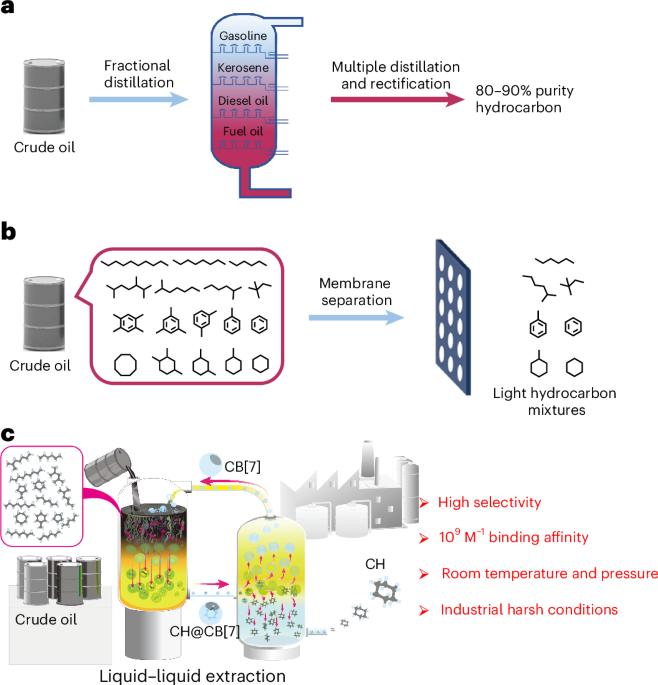分子筛对原油中烃类的选择性和可持续性分离
IF 27.1
1区 环境科学与生态学
Q1 ENVIRONMENTAL SCIENCES
引用次数: 0
摘要
从原油中可持续分离碳氢化合物对于减少化工行业的能源消耗和碳排放至关重要。目前的方法是能源密集型的,由于原油中重叠的物理化学性质和分子复杂性,不允许分离特定的碳氢化合物。本文介绍了一种利用葫芦b[7]水溶液直接从原油中提取环己烷(CH)的高效分子筛策略。CB[7]通过具有超高亲和力(2.5 × 109 M−1)的形状和尺寸选择性结合,在环境和恶劣条件下实现高效的CH分离。工业验证表明,从共沸苯混合物和粗馏分中获得的CH纯度为99%,与目前的工业方法相比,节能57.4-82.4%。通过展示基于CB[7]的分离的可扩展性和稳健性,这项工作突出了分子筛在可持续、经济地从原油中回收碳氢化合物方面的潜力,为大规模、可持续的碳氢化合物净化铺平了道路。原油是不同碳氢化合物的混合物,它们的分离仍然具有挑战性。在这里,这项工作显示了一种分子筛,可以直接,选择性和可持续地分离有价值的成分。本文章由计算机程序翻译,如有差异,请以英文原文为准。

Selective and sustainable separation of hydrocarbons from crude oil via molecular sieve
The sustainable separation of hydrocarbons from crude oil is critical for reducing energy consumption and carbon emissions in the chemical industry. Current methods are energy intensive and do not allow for isolation of specific hydrocarbons due to overlapping physicochemical properties and molecular complexities in crude oil. Here we introduce an energy-efficient molecular sieving strategy using cucurbit[7]uril (CB[7]) aqueous solution to directly extract cyclohexane (CH) from crude oil. CB[7] enables efficient CH separation under ambient and harsh conditions through shape- and size-selective binding with an ultrahigh affinity (2.5 × 109 M−1). Industrial validation shows >99% CH purity from azeotropic benzene mixtures and crude distillates and achieves 57.4–82.4% energy savings compared with current industrial methods. By demonstrating the scalability and robustness of CB[7]-based separations, this work highlights the potential of molecular sieves for sustainable, cost-effective hydrocarbon recovery from crude oil, paving the way for large-scale, sustainable hydrocarbon purification. Crude oil is a mixture of different hydrocarbons, and their separation remains challenging. Here this work shows a molecular sieve that allows for direct, selective and sustainable isolation of valuable components.
求助全文
通过发布文献求助,成功后即可免费获取论文全文。
去求助
来源期刊

Nature Sustainability
Energy-Renewable Energy, Sustainability and the Environment
CiteScore
41.90
自引率
1.10%
发文量
159
期刊介绍:
Nature Sustainability aims to facilitate cross-disciplinary dialogues and bring together research fields that contribute to understanding how we organize our lives in a finite world and the impacts of our actions.
Nature Sustainability will not only publish fundamental research but also significant investigations into policies and solutions for ensuring human well-being now and in the future.Its ultimate goal is to address the greatest challenges of our time.
 求助内容:
求助内容: 应助结果提醒方式:
应助结果提醒方式:


